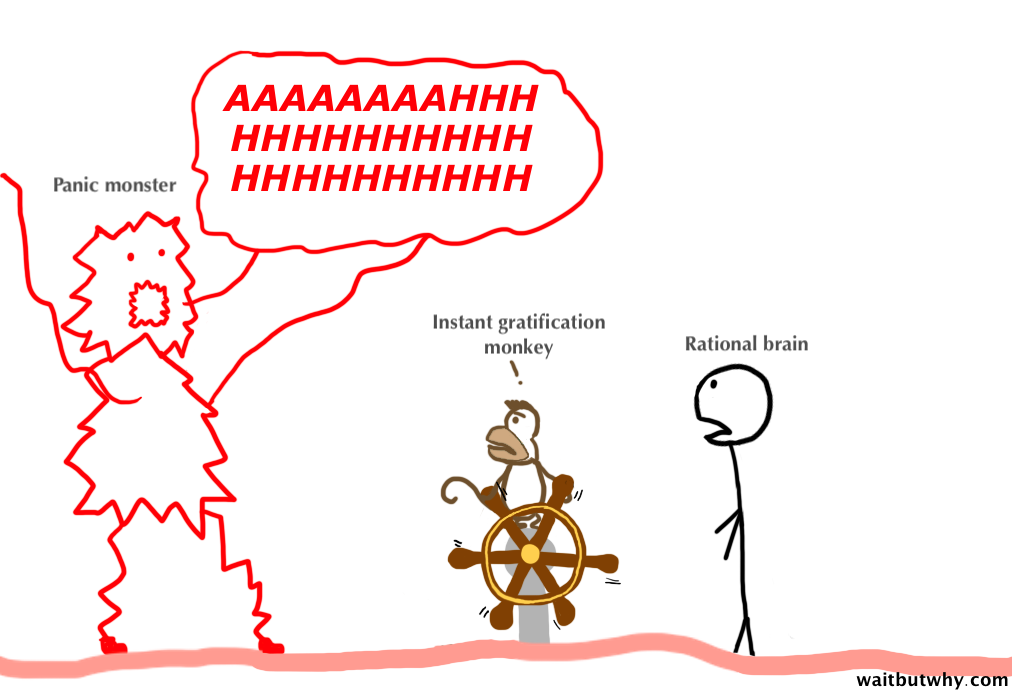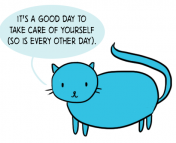We’ve all done it. We’ve all subjected ourselves to that prolonged feeling of dread, that impending black cloud of an imminent deadline.
Procrastination. A formidable foe.
We tell ourselves that next time, we won’t wait so long. We’ll start that homework right when it’s assigned, not the day before. We’ll start writing that blog post earlier than the day before it’s due to go live (definitely not speaking from experience here……..). Yet, we continue to subject ourselves to the same self-sabotage over and over in a vicious cycle of guilt, panic, and brief relief mixed with regret that we didn’t spend more time on that important application. Why?!
My favorite explanation of what living in the mind of a procrastinator is like is Tim Urban’s “panic monster.” In his scenario, your rational decision-making brain is accompanied by a cute little pet: the instant gratification monkey. Your rational brain knows you should be working on that important task. But your deadline isn’t so menacing — you still have a week or a month to get it done. No problem!
Unfortunately, your rational brain doesn’t know the first thing about pet monkeys, and somehow the monkey is in charge. Worse, the monkey only cares about making the present as enjoyable as possible. Why would we torture ourselves with that homework problem when we could watch a YouTube video instead? (I suggest Tim Urban’s TED talk if you go this route)
Luckily, your monkey is afraid of something: the panic monster, who finally awakens when your deadline gets too close. Like the flip of a switch, you turn from a distracted, YouTube-watching procrastinator into the poster child of productivity. Ten-page paper due tomorrow? No problem, just stay up all night. That item on your to-do list that’s due in an hour? Easy-peasy, that’ll only take 20 minutes.

If we’re being honest with ourselves, this constant cycle of procrastination, guilt, panic, and regret is no way to live. Why not just spend that 20 minutes completing your task earlier, instead of feeling guilty for a week and then doing it at the last minute? But that darn monkey keeps hanging around. This is an incredibly common experience, as evidenced by this viral tweet from Susanna Harris, a graduate student at the University of North Carolina in Chapel Hill:
In fact, the reason for this post is a tweet of mine from a few weeks ago, describing a very similar situation:
I was overwhelmed by the response — the tweet received almost 400 replies sharing experiences and techniques for combatting procrastination. So how can we start taking control back from our instant gratification monkeys?
- Make lists.
If to-do lists work for you, write down everything you need to do. Choose the 4-5 most important things (everything else can wait). Then start tackling those tasks and give your inner gratification monkey what it wants. Alternatively, use post-it notes to track your uncompleted tasks and enjoy the satisfaction of taking them down and crumpling them up! - Tackle the easy/fun tasks first.
Do you have a task that will only take ten minutes to complete? Do that first. Appease your pet monkey, hopefully then it will start to learn that accomplishing your tasks makes the present enjoyable too. - Break your big tasks into smaller tasks.
“Write a ten-page paper” is too daunting — it will take way too long to give your pet monkey the gratification it craves. Instead, break your paper into sections: write the introduction, find those couple of missing references, write the caption for Figure 2, and so on. - Work on something even more tedious and less enjoyable.
Soon, the original task will become the more appealing option! Alternatively, give yourself full permission to indulge in the task you’re procrastinating with — reverse psychology might make you want to work on the original task instead. - Try to figure out why you’re procrastinating.
Often, we procrastinate because we’re afraid of or too stressed about some aspect of the task. Have a job to apply for? Maybe you’re afraid of being rejected. Do you have to prepare a presentation for class? Perhaps you’re worried about not meeting your or your peers’ expectations. Try writing down the pros and cons of working on the task — chances are the pros will outweigh the cons. - Schedule the tasks in your calendar and set a timer.
If you rely on your calendar to manage your life (like me), try physically scheduling out your day. Block out 30 minutes or an hour (or even just five minutes) for that homework problem. Force yourself to work on that and only that. And once the blocked time is up, stop working on it. Move on to the next task (unless you are really on a roll). This way, you’ll only have to appease your pet monkey for a short, defined amount of time. - Tell friends and family members about your deadlines.
And ask them to check in! Sometimes all it takes is having a little bit of external pressure. Even better is if your friends also have deadlines so you can keep each other accountable. - Reward yourself.
Like it or not, we (and especially our pet monkeys) are reward-driven creatures. Give yourself a coffee or an episode of your favorite show as a prize for completing your task. - Remove distractions.
Rid yourself of the temptation to do anything except your tasks. Sit in a room without your phone, a TV, or pleasure-reading books, and even turn your computer’s internet off. Your choices will be to either sit there and do nothing, or work on your task. Your boredom will probably win out! Relatedly, there are a number of browser extensions and apps intended to limit distractions (e.g. Cold Turkey, StayFocusd, Limit, or Momentum). - Consult other resources for combatting procrastination.
There are endless resources about strategies to combat procrastination — a Google search alone will turn up pages of results. Tim Urban also wrote a follow-up post about ways to beat procrastination. Finally, don’t be afraid to read self-help books or listen to podcasts! Getting Things Done and The Motivated Mind were specifically mentioned in my tweet replies.
It will take work to conquer your inner instant gratification monkey. But I hope this crowd-sourced list of tips and tricks will help you start getting that pesky pet primate under control. Tomorrow, of course.
Thank you so much to everyone who responded to my tweet, your replies were invaluable in writing this post!




